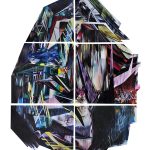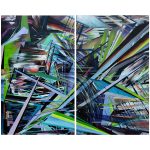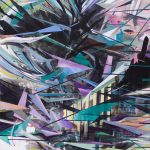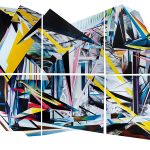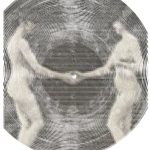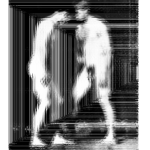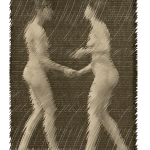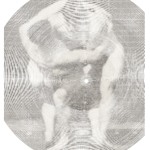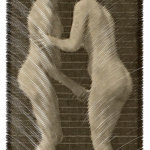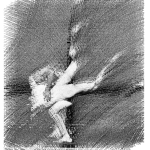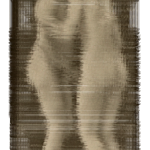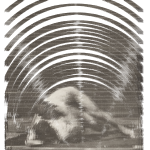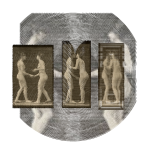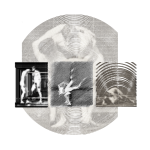The screen contains two moving images: a single shot of clouds in a blue sky placed directly above another single shot of water flowing over a weir. The cloud density in the shot of the sky changes over time – a change which influences the appearance of the water flowing over the weir. The image contains two shots of different forms of water.
Category: Aquifer
Some Trees: An Incidental Elegy
This essay was a finalist in the 2018 Editors’ Awards
competition here at The Florida Review. We’re proud
to present it here in Aquifer.
Let me be clear: I read the classifieds because I had nobody. Five or six years into the new century, I trudged through Southeast Portland, rented the upper level of a duplex across the street from a bar that served fried chicken all night and $1.75 domestics. I never cut back the ivy that crept all the way over the second floor windows, so the light in my room was always dim. In any case, the sky was invariably grey. The rain was less rain but fine mist.
In the mornings, I waited for the bus with the smell of yesterday’s oil in the fryers. I took the local newspaper from a dispenser outside the bar, then the same seat on the same bus every day. There were poems tacked above the windows as part of a citywide initiative to bring art closer to daily life. Each morning I read the same John Ashbery poem opposite my seat then opened the local newspaper and turned to the classifieds: the personal ads; items for sale or trade; miscellaneous services; missed connections. I never bought anything. I never replied. But I needed the idea that there were people on the other side. And the newspaper let me believe that even though I stayed so isolated. Other people existed, and as they existed they felt, and reached out with their advertisements. Not only did they exist but they were also alone and—since moved to action—maybe even more alone than I was.
Through these grey months, there is a single ad I remember most. It stood out among the used microwaves, gently worn tires, and everyday loneliness. It was exuberant. I could not believe it was real: a man, beneath a name eccentric and rich with consonants, offering formal pinball lessons at a location close to my duplex, and offering them in a tone ripe with awareness that these lessons were precisely what the world needed. “Master the flipper. Amaze your friends.” I tore the ad from the newspaper, circled it with a blue sharpie and tacked it on the fridge. I did not call. To call would invite the possibility that it wasn’t real. And I had to believe it was, that this person existed, offering his service at a time when all I could muster by way of invitation to the world was to drink too many $1.75 beers and in the morning peer into the semi-darkness through the windows of a bus.
—
A mile or so southwest of Fish Lake, Utah, there is a run of aspen more than 80,000 years old. The dendrologists have given it a name—Pando, from the Latin to mean “I spread.” Although Pando covers over one hundred acres and appears to be a forest containing a multitude of separate trees, it is in fact a single organism with a vast, interconnected root system, a clonal colony of Populus tremuloides or quaking aspen. Pando’s approximated mass of 13 million pounds lands it in the running to be the heaviest organism on the planet, and at 80,000 years old, very possibly the oldest. But even such an unfathomable lifespan may be an underestimation: some dendrologists argue that traditional aging techniques are inappropriate here and in fact Pando is closer to one million years old. One million years. I am thirty-eight. Yesterday I was looking at photographs from the early 1980s and felt a bodily dissonance between the world then and now. But Pando met existence in an era before human language and still exists today, adjacent to our sphere of depleted fossil fuels, snowballing automation, and deceit.
I keep saying “it,” but Pando is a “he.” This proliferation is the result of the asexual reproduction of a single male plant. It seems strange to me that such plurality could be contained in a male organism. I would immediately assume such capacity to be female, although it should be noted that in keeping with a cardinal condition of maleness, Pando has thrived and spread in the most favorable conditions possible. Geographic and climatic variations over the millennia have effectively wiped out competition from species of conifer or other younger aspen.
If there are degrees of solitude then Pando represents an exponential function. He may be prolific, but he is alone and—with only countless iterations of himself for company over thousands and thousands of years—compelled into an everted kind of introspection. It has been 10,000 years since Pando’s last successful flowering. The climate of central Utah is gradually warming, and, despite his monumental proclivity for survival, it has been agreed by the various dendrologists, environmentalists, and biologists that Pando is dying. The experts cannot be certain why. Grazing elk may have depleted new shoots and stems to replace the old. It could be the result of drought, of insect infestation. Or it could be that after multiple epochs, Pando has finally had enough. Regardless of the reason, without new growth the end is coming, and when it comes it could be sudden.
—
I am interested in impossible writing. As such I am interested in the plural text: how facing the impossible in language may necessitate and birth a text that dwells in the fractured amalgam of two or more known forms. I am interested in the new text that finds form in the aperture that this fracture creates: the text that becomes possible as the imprint of writing into the impossible. Such a work is realized through the multiplicitous capacity of that imprint, which is itself a function of the multiplicity inherent to language itself. Every word is a kaleidoscope of subjectivities, tamed by the socially determined conditions for its usage. The word was not complicit in this agreement. And words are not, by their nature, tame. To assume they are is dangerous. Every word maintains the radical potential for departure, and as such this potential for movement is retained by any sum of these parts. You cannot build a house of mirrors and not expect it to reflect the light.
So then a text that may appear in prose, in service to the form of the essay, may be constructed around an architecture more readily associated with poetry, containing further architectures beneath its surface, narratives that exist independent of the semantic value of the language. I mention this now because these are the ways a singular text might transcend its apparent plurality, how every word leads multiple lives in the air and on the page, and most importantly how a run of trees near a lake in Utah may indeed be the single oldest and most massive living organism on our planet.
This morning I flicked through images of Pando I found on the internet. Some had verses of scripture superimposed on the photographs. Others diagrammed the connection of each tree to its shared system of roots. Almost without exception, the photographs were taken in the annual interlude when the aspen leaves hang golden on pale boughs—that moment of transition, multiplied across acres of forest in singular association. I reread the poem I had read hundreds of times from my seat on the bus, John Ashbery’s “Some Trees.” Here it is again, today, opening in quiet triumph, moving through a quaking order into ordained stillness, deferring meaning toward a reality in which different perceptive realms are allowed to exist simultaneously. In each, the world is reborn: into the collapsed dimensions of space; a new desert music; the ramshackle frames we place upon time; the universe of the poem. “These are amazing: each / Joining a neighbor, as though speech / Were a still performance.”
—
Several years ago, at a time between the bus rides in Portland and my life here today, I went on a weekend training to become a hospice volunteer. I ascended an elevator to the fifth floor of the largest office building of an out-of-town business park and took my seat in a loose horseshoe of Formica trestles that opened onto a cheap-looking podium. A young woman stood in front of the podium and greeted each prospective volunteer with a cheerful nod. This disposition, complemented by her yellow pantsuit, suggested she was only stopping by en route to a less somber occasion, so much so that when she spoke I was disarmed by the soft attention in her voice. If we had been recently bereaved, she explained, we were encouraged to withdraw from this session and enroll at a later date. She did not specify how much later, how long grief might linger until it became manageable, until we felt able to move beneath it and perhaps take on some portion of the grief of others. Nevertheless, her message was clear: if you think this may be too much, it will be.
Morning sun cut through the Venetian blinds leaving a thatch of light and shade on the Formica. A man in navy plaid cleared his throat. His cat had died the previous weekend. The room mumbled condolence. Nobody left, though soon enough the cheerful woman surrendered the podium to a middle-aged chaplain in a purple cardigan and red eyeglasses. She stayed for the chaplain’s introduction then issued a final smile and nod into the room as she turned and departed.
That morning we made our own introductions, talked a lot, drank coffee from diminutive paper cups, and assembled into various combinations of small and large groups. We watched films and slide shows about the ways people might leave their lives, about the companions who surrounded this passage, how they had begun to find meaning there, the way such rupture could not be closed but could become more familiar. Each table had a small box of tissues and a pale blue wallet folder with our agenda. We worked through it together, establishing a solid but temporary kind of trust. We ate sandwiches in the lunchroom. We did not really become friends.
On the second day, the chaplain led us through what she described as a difficult but important exercise. She closed the blinds and dimmed the lights in the room. She pressed play on a portable CD player: the sound of waves breaking, then piano, a harp. Close your eyes. We were to imagine ourselves in a private room, months after our own diagnosis of an aggressive cancer. There had been many treatments, visits, hopes, painkillers. Over the last few weeks, though, a new weakness had set in. Breathing had become labor. Movement required disproportionate effort. The time was drawing close.
In the midst of this scenario, the chaplain had us compose a list of those we held closest, and at the threshold of our departure from them, to select one name from that list and write. What would we speak on the cusp of speech becoming impossible? How would we locate the language of this transition? What would we say if we could?
—
Over the next months, I could not shake the idea of this utterance when facing the impossible; the language that originates both with and against death. I read deeply toward and around it. I found an anthology of Japanese jisei—haiku-like poems composed on the verge of death. I read Akutagawa and Edouard Leve. Desiring something more immediate, I found suicide notes collected on the internet and read them, and read them again. I felt suddenly like a tourist and withdrew and returned to the exercise I had learned in hospice training. I selected a name. I wrote toward them. I read. I returned again.
And I still return. Because it is this utterance that forms the center of everything I would write—this text spoken into the impossible, its capacity to contain all that it contains which is the impossible itself, the uncontainable. I want to bring language to approach the unapproachable. I want to bear witness to a singular text that holds these infinite pluralities. I want to watch it buckle. I want to see it fall.
I want the elusive syntax that embodies multiplicity, that collapses the moment and makes “tense” unnecessary, that creates a new pronoun rare to the ear but personal to all such that as I write I might address not only a named individual but everyone I have ever known and loved with no lapse in intimacy.
—
It wasn’t long after I found the pinball ad that my life changed. The events were as independent as two events in a single life can be. I met my partner in a different bar. The loneliness I had worn as a badge of honor began to subside. I rode the bus less frequently. I took myself and my life less seriously. My need for the classifieds diminished. The landlord’s son came by to cut the ivy from the windows, and it was too bright in the mornings. But the ad stayed on my refrigerator the whole year until I moved out of the duplex, then found a new space on our new refrigerator in our new apartment together. Then the next year when we made the cross country-drive to Colorado and started up again, we started up with the ad on the refrigerator. Master the flipper. Amaze your friends.
More than ten years passed. I don’t know why I googled the pinball guru. I don’t know what it was about that particular day that made me remember his ad, made me want to know. Considering it now, it was something more gradual: coming to a place where it didn’t matter if there had been a person behind the ad, if the man with the eccentric name had not been real. I no longer needed anything from him, and in turn, now feel an almost insurmountable distance between the person I was, drinking and sleeping alone in Southeast Portland, and the physician, husband, and father of two who is writing this.
I typed the name into the search bar and found an article from around the time I’d seen his ad, the top hit, an interview, conducted by the first and only person to take him up on lessons. They were real. I found a photograph of him beside a pinball machine, wearing a black and red shirt, not quite smiling. I found his real name, his photography and artist’s statement. Then I found the news of his death, tributes from the local pinball community, and, finally, posted by close friends on a personal blog, I found his suicide note.
It was long, more than four pages in single spaced ten-point Times. He had mailed it to arrive after he was already gone. And I realized that somebody must have sat and transcribed it, word for word, from the copy that arrived in the mail into the version published on the blog. I wanted to know if it had been written by hand. I wanted to know how. And then I felt stupid and invasive, that this wasn’t mine and could never be mine, and I closed my computer and sat in silence.
I turned over the basement trying to find the ad. I sorted through boxes looking for a scrap of newsprint with a classified circled in blue sharpie. I did not find it.
I came back the next day and clicked through his photographs, many of them arresting and beautiful, one in particular: the corner of a large building in black and white, spindled winter branches reaching over the foreground, silhouetted against grey concrete; pages and pages before the posts stopped abruptly in February 2011. I thought maybe there was another folder in another box in the basement. I continued this way for several days, turning toward him, then away. After nearly three weeks, I read the note.
—
It opens with love, apology, the blunt necessity of his action. That it would arrive after he was gone was long planned: he admits the prose itself had been through several drafts and revisions. His suffering is palpable throughout. As is the brute fact of his last desire—that he might cease to exist, that he might never have existed, caught in an excruciating balance with a fear of hurting those around him, of whom I was never one. His life touched mine in only the smallest way. It feels close to ridiculous that I need to take this so far.
“Pain is a relative beast,” he writes. And I understand that although sadness exists on a spectrum, despair is a singularity, whose gravity is infinite and cannot be escaped. There is sadness that drinks $1.75 beers alone. There is a far deeper sadness that casts spindled silhouettes over everything we build.
In the basement of the safety-net hospital in Denver is the Correctional Care Medical Facility. It is effectively a jail where patients who are incarcerated or in police custody can receive care. When I started my training there, a nurse told me about two women who had transferred from a regional prison with infected upper extremity wounds. They had cut into their arms and stuffed scraps of food into the lacerations hoping for the very infections they developed, for their transfer to the basement of the hospital where they lay handcuffed to the bed, hoping, because even this was better than where they were.
What I read over the single-spaced pages of the suicide note was that any previous capacity for hope had been absolutely depleted. Not only was it gone, but there was nothing that might bring it back. Not art, nor companionship, nor medication or other drugs: nothing that could imprint upon this pain. I like to think I may know something of distress, and that in turn I am developing a capacity for a broadening empathy. I have tried to place myself in such proximities, to be present and to listen. But I realize I know nothing. Because beside this darkness I have nothing, no true frame of reference for these emotions, no apparatus to understand this despair. It remains, always, around the next curve of the bay, hidden by the rocks and crashing waves, immense and impossible.
—
Midway through the note there is a volta, away from the devastation of personal struggle and toward the collective failure of humanity to examine ourselves, complicity in the gross disparities that are the engines of capitalism, our shattering capacity for willful ignorance, that cruelty. But it is in this bleak assessment of the world he is leaving that something emerges, that there could be a collective engagement to remedy our failures. “We must all learn to think on a vastly larger scale,” he writes. We must cultivate our capacity for empathy. We must indulge the pure qualities of our consciousness through education, through creativity, and through art.
It is art that has the negative capability to address the impossible, the potential to perform various grammars of simultaneity. The practice of art is an engagement of the imaginative mind at its intersection with the practical and as such a gesture toward simultaneity. In turn, a gesture toward simultaneity is a gesture toward the impossible. I want an art with the capacity to stack our multiple perceptual, introspective, and reflective realms into a simultaneous moment of consciousness, a mirror for the plural activities of thought. I want these moments multiplied across our numerous essays and failures. I want their silhouettes to thatch our daily lives, fading and brightening with the light and shade, for it is these oscillations that are the motor of our transcendence: to breathe, to fail, to return, to create.
When we realize this capacity is when we begin writing the impossible. A poetics of mortality depends on failure just as art is itself both a practice of failure and the persistent return from that failure. In this respect, the only requirements of the impossible are honesty and imagination. We need be nothing but ourselves: luminous beings that somehow occupy bodies, displacing in our own crude echoes the invisible matter that surrounds us, a silence already filled with noises.
—
On June 4, 1923, Frank Hayes, a thirty-five-year-old stableman, horse trainer, and occasional jockey, won the Belmont Steeplechase despite sitting dead in the saddle. He had been alive when the race began, had suffered a massive heart attack at some point before his horse, Sweet Kiss, crossed the line at 20-1 to win by a head. It was only when the owner and stewards approached him with congratulations that they noticed something amiss.
There is a middle-aged white man at the counter. He orders a cup of coffee. “Small, medium, or large?” asks the barista.
“Medium,” says the man, before the barista can finish the word “large.”
“Room for cream?” she asks.
“No,” says the man, “room for milk. For milk.”
But, I want to tell him, this is an absence that does not specify. It cannot decide on the presence that will take its place. As when god withdrew from the world to make room for creation, there was no specification for what would fill that space. Absence cannot see beyond itself because it has no beyond, the way grief is a kind of gravity: it doesn’t care who you are. What I am trying to say is that we will not be present for our own deaths, only the moments leading up to them. We cannot orchestrate the absence we will leave, despite our best attempts: notes left, debts paid, jockey’s silks pressed, 2% not half and half.
It’s all just around the next curve of the bay: children sleeping under blankets in the back seat of a 1980s sedan; a racehorse at full tilt with a dead man in the saddle; the tremendous quaking aspen southwest of Fish Lake; the moments in which we are able to move, to take on some portion of the grief of others; a man, an artist, in so much pain that he has tragically and meticulously chosen absence over presence.
—
When I was working the night shift at the safety-net hospital, I admitted a man to the inpatient mental health unit. I admitted hundreds of people for various ailments that year, but this man I remember so clearly. He had been seen in the ER for “suicidal ideation,” sent directly to psychiatric emergency services where upon more thorough evaluation had been adjudged an imminent danger to himself. He did not dispute this.
We sat a table on the acute unit where any means for self-harm had been meticulously removed. There were no door handles from which a noose might be tied. The blue plastic chairs in which we sat had only the softest contours, weighted so heavily as to resist being easily picked up or thrown. He kept his spine straight in his seat. Behind him through the wide windows spread out the condominiums and office blocks downtown. I will not describe his face, the color of his hair or eyes. I will leave unmentioned the particular timbre of his voice, but from this plastic seat with the city behind him, he spoke as an observer of an utterly impenetrable world, not as one who dwelt within that world but as one who had become only witness, removed from immediate experience, envious now of the objects around him: the table in his apartment, the books on the shelves beside it, the quiet trees outside his own window at home, their bare branches, their fallen leaves.
“When my body becomes ashes,” he said, “then I’ll become an object, too.” And he showed me the scars on his forearms, an inch or so proximal to his wrists, on his right side creeping onto his palm. They were mostly signatures of older wounds, years ago, the result of burning himself with cigarettes in brutal but earnest inquiries into whether he might still feel pain, feel anything. Most—aside from one fresh blister, that one seared only days prior to our encounter.
I saw such visceral self-interrogation on a disarmingly frequent basis that year. What marked this man apart was his attitude to these injuries. As he held his wrists out to me, he was not proud or ashamed. He did not wear his scars as medals, as intended testimony to the pitch of his suffering. He wore them with utter indifference, carried them as one would carry only the brute facts that returned him to an exhausting and circular logic: the drive to become object, accessible only through an act of ultimate subjectivity.
—
For the three or four years that bridged the 1980s and 1990s, after school was out for summer, we packed up the family sedan until it could bear no more weight. My father took his two-week holiday, and we crawled out of the driveway, to the south coast, on a passenger ferry, then along the Autoroutes of France until we came to a campsite by a lake about an hour south of Bordeaux. We unloaded the car into our rented trailer surrounded by maritime pine and spent every day at the freshwater lake. We were children. The water at the edge was shallow and warm, gradually deepening until the temperature chilled and the depth dropped off dramatically. The sudden difference meant you could stand chest high as a ten-year-old and stare out into the dark expanse of open water. We swam into that darkness and tried to find the bottom. We treaded water with no grasp of what might lie beneath. Younger siblings played closer to the shore. Our parents reclined on beach loungers, but my cousin and I, this is where we stayed, close to the darkness, swimming in and out, diving as deep as we could then returning to the shallows.
I have made several resolutions. I will make the journey to Fish Lake, Utah, and I will stand among the aspen. I will return to Portland, ride the same bus route and recite the poem I will have learnt by heart. When I do so, I will speak clearly. My voice will be sure. I will continue to place myself as close as I can to these things that I cannot fathom. I will swim into them. I will establish a new syntax of transition, I will live and write inside it, then I will burn it to the ground.
To write toward death is to engage the impossible. It is to pace the same ground over and over, to initiate and repeat, to mire oneself voluntarily, to sink. But it is also to remember oneself as an embodied being, with a beginning and with an end, capable of touching other lives in unknown or apparently trivial ways, seldom in plain sight, but in an unseen and tantalizing proximity.
You will be with me at the bus stop in the smell of last night’s fryers. You will be with me in the dark, on worn upholstery. You will be with me in the places where language refuses, light thatched on Formica, when breath becomes labor. You will be with me as our silhouettes rise and depart from each other, dappling the tallest buildings, taking leave from our bodies to maunder the city alone. Pinball is dying. Pando is dying. But for this instant, in these golden minutes we are here together, and everything I say to you, I say to myself:
If you think this may be too much, it will be.
Learn to think on a vastly larger scale.
Master the flipper.
Amaze your friends.
You and I are suddenly what the trees try to tell us we are.
The Secret War on Laos: UXO
This body of work is inspired by the non-profit organization, Legacies of War, and their mission: “To raise awareness about the history of the Vietnam War-era bombing in Laos and advocate for the clearance of unexploded bombs.” As a refugee/immigrant, the process of connecting and disconnecting with a place or community are abstracted ideas of migration. Similarly, the collage and painting process is unpredictable and is an ongoing dialogue about assimilating and relocating into another culture and space.
What We Ate
Not loin chops cooked Moroccan style,
palm-sized, presented like gifts
simmering with harrisa-spiked hummus,
nor the shoulder placed atop a small knoll
of onions and peppers, flavor brimming
in each slashed sinew, but the heart,
that muscle which, to me, still seems untouchable
in the hierarchy of organs. In French curry
we ate what once beat in the smooth body
of the lamb, the taste of iron coiled
around our tongues like a rope swing,
the meat perfectly tender to chew
on a dilemma: better to waste nothing
or keep one thing sacred, worshipped
as we do our own ventricles?
And as we swallowed I did not think
of the lamb force-fed with a stomach tube
in a barn in North Georgia, its legs wobbly
on an altar of hay, but a hundred other hearts—
Nefertiti’s pulsing wildly for the sun god Aten,
Napoleon’s stopped briefly at Waterloo,
and those closer, more real—
my mother’s stepped on like an amaryllis
in a field swollen with weeds, my brother’s
heart, desires I’ll never know, humming
like a complex engine, its pistons
clogging with blood, and so forgive me,
little ounce of lamb, for taking
your heart on a piece of jagged
ciabbata, and when I say I forced you down
with water, believe me when I tell you
I took only the slightest pleasure
and that I did not clean my plate.
Reflex
Fumble on the big screen, everyone
up in arms. My daughter grasps my shirt
while nursing and can’t let go. Across the room,
my mother applies Chapstick without taking
her eyes off the screen. It’s Christmas. Everyone believes
in miracles and wants to hold the baby. My grandmother
sits at the table holding a doll. Beyond her, a train
slips through the snowy field carrying—what? Time
moves backwards on the field. Less than a minute left
on the clock. My grandmother’s lips barely close around the red
spoonful of Jello with coconut. A marshmallow falls
from the spoon in all its puffed-up,
childhood ecstasy. The game is nearly over. Pins
and needles. The tree is heavy with color
and ornaments of beans and children’s faces.
My grandmother tightens her fingers around the hanky
she has always held. Eventually, there is nothing
left beneath the tree. Everyone kisses the baby.
They each slip a finger into her palm,
and she struggles to let them go.
Homer
I’m an old man and he’s an old man, seventy-eight, the two of us, on our birthdays just past. My wife is dead and his wife died too, a fact of life we’re living with. His children are grown and he lives alone. So are mine. So do I.
There are some differences, though. And here’s one. He exists and I do not.
It’s morning. His bulldog is licking his bare feet as he stands at the sink and drinks a glass of water to knock down the queasiness in his stomach. He drank too much last night and the slobbering tongue lapping at his toes is not helping his hangover. He shakes his leg at the dog. Getting the hint, she finds a half-dozen pieces of kibble in her bowl and finishes them before waddling into the room where he’s worked for the last forty years. She is already way ahead of him.
He takes a mug of coffee from the pot he’s brewed and walks it into the room where he turns on a lamp. He doesn’t so much need the light in the room. He needs the light in his head.
Last night was a bad night for him. It’s a year this month since his wife died. He’s been having trouble getting past the memories of all the years he devoted to her, the children, all that he did for them. For what, he muses, now that it’s all done and gone? He’s also having trouble keeping things straight in the here and now. His grandkids’ names, which he mostly can’t remember. Bills he paid or didn’t. Last week he stuck the TV remote into a potted plant, wasn’t able to find it for three days. So he’s been drinking alone at night and a little too much, thinking it will help and that he can handle it like he used to, and when he wakes in the morning it would be unbearable if he didn’t have me to knock around and focus his mind.
On the page on the screen in front of him, he’s left me in a tough spot. I’ve been here for eighteen, twenty hours now waiting for him to get me out of it. Or not.
In the life he’s created for me at the beginning of my story, he’s got me taking care of my grandkids, Sara and William, and William has just disappeared from the skateboard ramp where I think I last saw him. He’s had the kids’ parents go away for the weekend to visit old friends, and here I am in a park in Troy, New York, an ice cream truck crawling with tweens at one end, slackers and a couple of what appear to be runaway girls getting high at the other, the group of them under an overpass that filters traffic onto Route 7. I’m getting too old for this shit, and he knows it better than anyone, even as he begins putting words into my mouth.
“William! William!” He has me turn toward Sara. “Did you see where your brother went?” Before she can answer, he’s got me climbing up the skateboard ramp, arthritic hip and enlarged prostate in tow, approaching kids I don’t know, asking if they’ve seen my grandson: long hair, T-shirt with a grinning skeleton, ripped Adidas. None of the kids seem to know what I’m talking about, however, and we jump into a scene where the cops come and start to question me as if I’ve lost my mind as well as my grandson. And now my granddaughter Sara is crying. This asshole made her cry. “Grandpa, Grandpa, what’s wrong?” he has her ask me.
It’s at this point he decides he needs another cup of coffee. The fucker.
Two nights ago, when his own daughter called to check in on him, he couldn’t remember which of his daughters he was talking with. Worse, he couldn’t remember what either of them looked like. Took him ten minutes of conversation, dancing around the weather, what he’d had for dinner, if he’d been taking his Plavix and Paxil, before he could make sense of the voice to visualize this tall girl with short brown hair, now a fifty-year-old woman going grey. He never let on and she hung up thinking all was well. Then he cried for a good half hour.
As it turned out he never put William there in the park with Sara and me in the first place. Apparently, the kid’s parents let him stay with a friend this time, leaving me with only my granddaughter to care for. Sure, slurp your second cup of coffee, you smug son-of-a-bitch. Whoever coined the term misery loves company must have been talking about you and me.
He has one of the cops ask me my name, where I live, what year I was born, who the president is. I tell him Jack Benny, Nome Alaska, 1834, Abraham Lincoln. The cop, tone deaf to my sarcasm, starts to write it down in his pad before I wave my hand, indicating that I’m making a joke. “My name is Homer Fairchild, I live at 367 Seaforth Street in Troy, I was born in 1940, and the president is . . .” He has me pause a beat for comedic, can-you-believe-it effect. “Donald Trump.” At least he’s given me a good sense of humor and the politics to go with it. His politics. His sense of humor.
But the cops are not smiling. Why did you think you were here with your grandson, he has one of them ask me? Sara—bless the empathetic heart he’s given her—tells the cops that I always watch the both of them, so I must have forgotten for a minute that William wasn’t here today. Yeah, I forgot that William wasn’t here today, in the same way he’s been forgetting to dress himself in the morning and comes down to greet me in whatever he’s slept in the night before, barefoot, sometimes in just his boxers and a sweat shirt, sometimes a robe with nothing under it but the hirsute body he’ll be buried in. It’s half that he can’t find the reason to dress any more, half that he forgets he hasn’t.
He’s not what you’d call a household name, but he’s written a few books and between that and his teaching he’s made a living. Over the years, this house he lives in became the port he returned to daily to scratch out whatever success he’s had, his wife and children being the masts he lashed himself to whenever the temptations of drink or the urge to end it all came too close to overpowering him. A page or two a day, a chapter a month when he could manage it, three classes a week, one book every few years. Steady as she goes. Only now she does not go steady anymore. This boat that is his life is sinking, the sirens of the hereafter are singing his name louder all the time. All that’s left to him is his writing. It’s the wax he stuffs into his ears to resist the call to surrender.
The cops let me go, but Sara tells her mother what happened, and in the next scene he’s got me inside the whiz-bang of an MRI machine. It’s at that moment that I find out what my story is going to be about. It’ll be a short story and it’ll be about what all stories are about: life and death. But mostly death, or should I say the odyssey of getting there. Death sells. Death breaks our hearts.
When he was a boy, he rode a blue bike, a pinstriped Schwinn with a coaster brake and fat fenders that his father and mother saved up to buy for him. He cherished the bike in the way boys do and then someone stole it while he was inside a five and dime. This wasn’t in the days when there was a lot of that kind of thievery going on, and the loss of his bike was like the unexpected loss of a limb. He thought about revenge. He fantasized about finding who stole the bike and beating them half to death. But then the years went by and there was more of this kind of thing—a junior high sweetheart who dumped him for another older boy, his father dying of a heart attack when he was barely twenty years old—and he slowly realized that loss was not something you could revenge, that it was what we were put here to live with, and that’s when he found his calling. If he’s built his reputation on anything it’s as that author who writes about people who can’t seem to find happiness because loss keeps getting in the way. I wonder if it’s dawned on him that happiness is what you find after you accept that loss will keep getting in the way.
The tumor he has the doctors discover on my brain is massive and in a bad spot. To take it out they’d have to take out half my brain to get to it. He writes a passage that recalls the first thing I think of when they tell me about the tumor. A group of sentences about an uncle I had who also apparently died of a brain tumor and who, near the end when he was truly crazy, took all his money and rolled it up with rubber bands to stash it in the glove box of his Plymouth, wherein, one afternoon he took me out to the driveway and begged me to take the money and buy him a plane ticket to Greece so he could escape into the sun. Escape what, Uncle Tony, I asked him. Dying, he told me. Nobody dies in Greece, he said.
After that, he gets more daring and goes deeper into my mind, beneath the unpleasant memories and the fear of the pain I’m anticipating in the months to come, flooding me with a litany of those things I’ll leave behind when I forfeit the gift of my five senses. It’s as if he’s operating on my brain with words, not to remove the tumor but to remove and preserve the life around the tumor before it’s too late. My life. His life.
He has me recall the sound that the head of a zipper makes as it goes up the tracks of a jacket I’m putting on the first cold day of autumn . . . my mother walking into my room, thermometer in her hand telling me I’m not leaving the bed today, that delicious dryness of the fever that’s keeping me home from school . . . the unbelievable silence in the seconds after one of my infant children finally stopped crying after hours of crying in the middle of the night . . . the fat stack of property deeds on a Monopoly board after I’ve won the game . . . all the liquor I’ve happily drunk and how something so cold can feel so hot going down your throat . . . the last time I got caught in the rain . . . hit a baseball . . . kissed a girl I was not married too . . . lit a candle when the lights went out in a storm . . .
Writing this wears him out and in the middle of the sentence he gets up and leaves the room. He stands at a window in the kitchen and gazes through it. Two crows are squatting in a river birch he planted with his daughters in the back yard more than forty years ago. The crows are squawking at each other, bobbing in the branches at the top of the tree, snapping their beaks at the sky. With a writer’s force of habit, he silently translates the conversation he hears them having. Crow to English. Human to crow.
Don’t look now but somebody’s staring at us from inside the house?
Where? Who?
I told you not to look.
Right.
I’m hungry. You hungry?
Yeah.
Both crows turn their heads toward the window as if he might be the meal they’re looking for. What’s truly haunting, though, is how the conversation he’s put into their beaks times out so perfectly with the crows finding him behind the glass. For a second, he imagines he’s controlling their thoughts and actions in the real world, in the same way he’s controlling mine in the world he’s created for me. He feels powerful and terrified all at the same time. Yes, playing God has always had its downside. For years it’s made him ponder what those beings he’s created would do to him if they had the chance, given what he puts them through, him being the One that gave them life in the first place.
Without realizing it, he starts tapping his foot on the floor. It brings the dog over to him, her truncated legs working double-time to propel her, her tail wagging. She’s been around for fifteen years but right now he can’t bring himself to comfort her in the way she’s so eagerly walked over to comfort him. Yes, indeed. He deserves whatever he’s got coming to him from all those creatures he’s lorded over. All the more so as the dog begins to yowl when he walks away and closes her out of the room.
Once more now we face each other, he and I. He’s moved me from the doctor’s office into my daughter’s kitchen where he’s sat me down at a table along with my daughter and her family, a pointed party hat on my head. It might as well be a dunce cap. The muscles in my cheeks and jaw are mostly slack and across my mouth I endure the drooling smile of an idiot. He’s not happy he’s had to do this to me. As if that’s some sort of consolation for either of us.
Months have passed since the previous scene in the doctor’s office—lapsed time he tossed off with a double space of empty lines—and now it just so happens to be my birthday (my last from the looks of it). On the table in front of me is a cake blazing with candles and at my side he’s got my granddaughter blowing at them because I can’t. Cheek-to-cheek we are, this girl and me, as if her having do this task for a dying man was not already enough pathos for a reader. And now this hack has everyone signing happy birthday to me, making sure to mention that I’m having a hard time recognizing the tune.
It’s in the writing of this last sentence that he stops cold. He’s begun to torture the both of us, and he knows it. It’s one thing to kill a man little-by-little, it’s another to murder a perfectly good story by feeding it clichés until it chokes on its own words.
Slowly at first and then with more speed, he backspaces over the last lines he’s written. I can feel the life he’s recently given me unraveling and let me tell you it’s not pleasant—my family unwound and made to vanish in mid-sentence, the flesh and blood pulled off my bones, and then my bones falling off the page as well. Who among us could watch a part of their life disappearing like this, bit-by-bit, without feeling pain, no matter how badly written that last chapter of our life had been?
And that’s when I see what he’s doing. It’s one of those ideas that begin with a thump of veracity in his chest before lighting up the circuits on the left side of his brain like fireflies among the trees. He knows what he wants from his story now. It won’t make any sense for me, but it makes perfect sense for him. It’s his story after all and this is how he wants it to end.
I reappear in an automobile which looks a lot like the one he drove until he had to stop driving it because he was having trouble remembering how to get where he was going. And now he has me in that car, my tumor temporarily forgotten about, or maybe gone all together. Either way, it’s a miracle that only a fiction writer could pull off.
Pushing the engine of this suburban hatchback to go faster than it’s ever gone, he’s got me speeding down a two-lane highway in the middle of who’s knows where—trees and roadside mailboxes blurring past—and I’m singing out loud to a Johnny Cash tune on a country western station. Reaching into my jacket pocket, he has me pull out a pack of cigarettes. Unfiltered Chesterfields no less, and when I light one up it’s a surprise for the both of us, let me tell you. Neither of us has smoked for more than thirty years. Though that’s not the real surprise. The real surprise is that when I catch sight of the flame from my lighter flashing in the rear-view mirror he has me raise my eyes to look at my face, and when I do it’s his eyes that are staring back at me.
Having ever so briefly reinforced the point that I am no more charge of this than anyone is ever in charge of anything, he turns his attention back to me. I’m getting high on nicotine, exhaling jets of smoke out of my nostrils, lighting another cigarette off the butt end of the first as I suck it down to my fingertips, the car under my feet overheating as I push it beyond its limit. You’d think this was reckless enough. But no, because now he has me reach under the seat and pull out a pint of bourbon. Cigarette in my teeth, I unscrew the cap, steering the car with my knees. I want to tell him to stop, that’s he’s going too far. But who am I to judge.
And then, from the back seat of the car, a loud, rubbery fart rips at the air.
It’s obnoxious and full-throttled and nearly human, except it isn’t. It’s the bulldog. He’s put the Goddamn dog in the car with me. I’m not really sure if it’s supposed to be his dog or my dog but whoever it belongs to, he has the animal’s head hanging out the back window, her jaws spread wide, that madcap bulldog tongue flapping like a banner in the wind. He writes in a look of release on the dog’s face that foreshadows dog heaven, as if little-by-little this animal is letting go of the old dog she was to be born again as a new dog with new tricks.
Pulling the strings inside me, he has me put my arm over the seat to get a better look at the dog, twisting my neck, reinvigorating an ancient pinch in the nerve. “That a girl,” he has me say, tears of pain in my eyes. “Who’s a good dog?”
The dog barks loudly, twice, as if two solid barks were enough to cover the unmistakable irony that he’s put me in his car with his bulldog farting all over the ending of my story. All he has to do now is change the pronoun. And so he does.
We drain the bottle of Bourbon, drop the driver’s side window and toss the empty onto the road where it explodes into shards along the double white line. Taking a last drag of the cigarette we’ve been smoking, we toss that out of window too. After that, drunk with a drunk’s overconfidence, we slap on the brakes, skidding into a grassy rest area at the side of the road. We listen to the engine heaving until out of mercy we turn it off along with the radio. Outside, a wind is blowing in from the east, whistling through the crevices it finds under the fenders and wheel wells of the car.
In the backseat, the dog looks out the window and spots what we’ve come for, the origin of the wind. It’s the lake, a hundred yards off, and she barks at the sight of it. We’ve been here many times before in our lives. It’s where we’ve been headed all along.
Exiting the car, we help the dog from the back seat to the ground, her old legs no longer able to make the jump. Stooping down we take off her collar, and then teetering away from her, we hang it in a maple tree where its silver studs and brass name tag catch the sunlight filtering through newly sprung leaves. Behind us the dog shakes and flaps her loose skin as if she’s just shed twenty pounds of weight and fifteen years of life.
We walk on, focused on each step, overcompensating for the liquor, the dog shuffling behind. About halfway to the lake we stop again and, making sure no one can see us, we take off our clothes. First go the shoes and then the socks and then the shirt and pants and underwear. Stepping out of our shorts, we catch sight of our penis and laugh until we have to stop to catch our breath. This shriveled stump between our legs couldn’t even rightly be called a penis any longer; the thought of how it used to inflate itself at will, its little head with an ego of its own, being the most laughable thing of all.
Fully naked and reaching the edge of the lake, we put our feet in the water. We’re so drunk we barely register the glacial temperature around our ankles and, forgetting that the dog is not also drunk, we call out for her to join us. She’s still a few feet behind but this is where she’s going to draw the line. It’s as if she knows how cold and dark and deep the water is and if she doesn’t know that, well, she does know that she can no longer swim. And so we stumble back to cradle her up in our arms and carry the warmth of her into the water with us.
Up to our knees now, the dog squirming against our chest, we look out over the water and, there, materializing on the surface of the lake, is our wife. She’s swimming parallel to the shore, her hands arcing toward the sky before disappearing under the surface, water dripping down her arms with each stroke. She’s young again and she’s wearing a red, one-piece bathing suit, her auburn hair streaming in her wake. Behind us we hear our daughters arguing on a blanket in the grass, the sound traveling across the years. They’re fighting over the sandwiches in a picnic basket and we lap at the sweetness of their voices.
Up to our neck in the water, the dog hyperventilating in the crook of our elbow, we begin to swim, kicking both legs, paddling with the dog. We want to reach back in time to rejoin our wife, to kiss her wet lips and share the sound of our children giggling on the shore. But the sun has gone down more quickly then we expected, its flames extinguished by the lake. Everything has suddenly gone dark and quiet and we can’t find our wife, can no longer hear our children. It seems that we’ve lost them for good, and that’s the moment we realize why we did what we did for them and what it was for. Sweet Jesus, we were put here to convince them this world is not a dream, forced to play that practical joke on them because how could they have gone on living if we had not.
Frantic, the dog kicks her legs against our chest, her claws piercing our skin to form a rosary of pricks. We try to hold onto her, but she manages to break free, not yet realizing this isn’t the freedom she had in mind. She howls, swallows water and then begins to sink, great bubbles of air rising from her jaw as she goes under. We grab for her, more out of instinct than out of desire, and then we give up and follow her down.
I never asked for any of this, but then again neither did he. I want to tell him to write us out of this particular ending. To put us back in our chair in the room he sat in for forty years, to give us just one more day’s work, one last chance to forget the names of our grandchildren or the street on which we live, to misplace objects and go on enduring the pain of loss that we said we could no longer endure. Even that I’d put up with if he would just rewind us back toward shore, put the dog back in the car and the car in reverse, sober us up and let us die a natural, if altogether baffling death. Unfortunately, the best he can do now is to write us into a new life. It’s the best any God can do.
I have become a catfish and so has he. His mouth is a gaping toothless oval and so is mine. He has foot-long whiskers that float backwards toward a shark grey body and morning to night he trolls the mud under black water feeding off the bottom, me inside him, him inside me. We are the same. We have the same cold stare, the same small brain, the same small expectations. In this moment, we remain as one.
Swimming toward the surface, we move in tighter and tighter circles, winding our prehistoric spine, waving farewell to the water with our tail as we jump into the air, the sun warming our back, our eyes reflexive, turning gauzy against the light. It seems like forever we are up there under the sky, but when we do fall it’s not into the water that we descend. It’s into that room in his house that he’s lived in for more than forty years.
Everything is quiet, but for the ticking of a clock, the panting of the bulldog on the other side of the door, the clicking of a last sentence and the pop of the final period. It’s then that I understand how he’s abandoned me.
I am to be left here alone, separated from him for the first time, endlessly swimming in a lake of his invention, living for eternity behind a scrim of his imagination. He, on the other hand, will get up from his chair and continue to walk on land, forgetting more and more of what made him who he was until he forgets it all and fades away.
I exist and he does not. I will go on living for as long as there are eyes to see, and he will not. There is a time for words and a time for sleep. No matter if any of this ever really happened or not.
The Meek Awards NEW at TFR
We’re a bit late in getting this news on the website, but we’re proud to announce that a new donor has made it possible for us to select one author or artist (or to split the award between two) in each of our publication categories each year. These writers and artists are some of those who come to us through general submissions rather than contests or other means. At The Florida Review, we recognize that writers deserve to be paid for their work, and, though it remains financially impossible for us to provide remuneration for every writer and artist, we are happy that now every writer who submits to The Florida Review and Aquifer has at least the possibility.
For the inaugural 2017 year, we selected the following writers and artists for this special recognition. They represent the kind of work we love to publish at The Florida Review and Aquifer–both personally moving and aware of the wider world.
- Esteban Rodriguez (“Roadside,” 41.2) and Sherrie Fernandez-Williams (“the crossing,” Aquifer) for poetry
- Laura Farnsworth (“Salvio: A Short Story,” Aquifer) for fiction
- Re’Lynn Hansen (“The Han Gan,” 41.1) for nonfiction [also recipient of recognition as a Notable Essays in The Best American Essays 2018]
- Aubrey Hirsch (“The Language of Trauma,” 41.1) for graphic narrative
- Hannah Kaplan (“Dear Doctor,” Aquifer) for digital/electronic story
- Jave Yoshimoto (“Meditation on the Purpose of Art Making,” Aquifer) for visual art
Congratulations to these and all of the other wonderful writers and artists we publish. In 2018, we will be adding a winner in the short film category as well, and look for that announcement sooner than November!
Insertion Point
The Divine Visions of Hildegard von Bingen
A short film visualizing the ecstatic visions of the divine by renowned German medieval nun, philosopher and mystic Hildegard von Bingen, born in 1098, who invented the language Lingua Ignota, composed music and made discoveries in natural science. These were seemingly bestowed upon her by God through her visions in a period of time when this was forbidden for women. She was a writer, botanist, painter and a truly mysterious female trail-blazer. What did she see?
This abstract film by Paul Vernon was commissioned by Filthy Lucre supported by Arts Council England, with vocals from Josephine Stephenson, arrangement and recording by Joe Bates and music by Hildegard von Bingen.
Muybridge Comics
“Muybridge Comics” challenges the division between comics and visual art. While all comics are necessarily a form of visual art, most comics do not encourage individual images, or panels, to be viewed independently from their sequences. “Muybridge Comics” attempts both approaches, with the final two installments assembling the two, interwoven, four-part sequences into combined images more reminiscent of traditional comics pages. “Muybridge Comics” adapts photographs from the motion studies “Two Women Kissing” and “Two Men Wrestling” published in Eadweard Muybridge’s 1887 Animal Locomotion.

